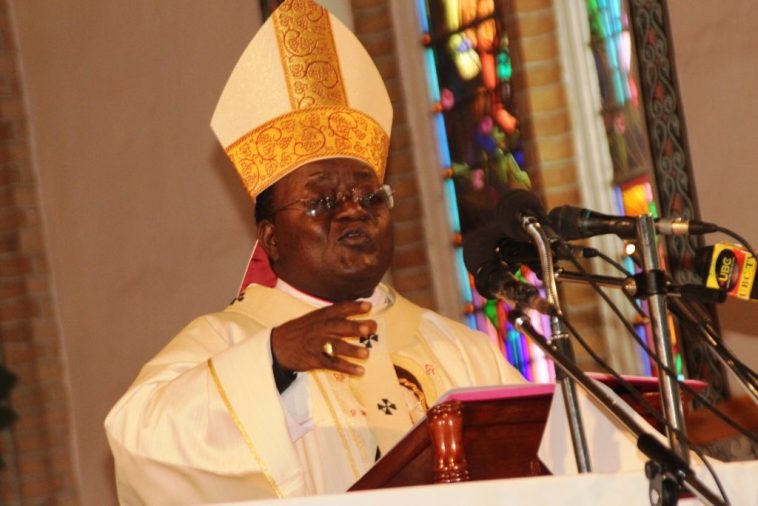UGANDA: Improper Celebration of the Holy Eucharist Is “Forbidden,” Archbishop of Kampala

Most Rev. Dr Cyprian Kizito Lwanga, Archbishop of Kampala Archdiocese- Uganda
In a decree issued early this week to “curb abuses on the celebration” of the Holy Eucharist in Uganda’s Kampala Archdiocese, Archbishop Dr Cyprian Kizito Lwanga has strongly condemned any form of abuse of the Sacrament stressing that it is “forbidden” to do so.
Highlighting five areas of concern on reverence for the Holy Eucharist, the Archbishop has indicated that he has issued the decree “relying on the Liturgical and canonical norms of the Church Universal and basing on the vigilance which is required of him by law to fend off abuses in the liturgical life of the Church.”
“It is forbidden to distribute or to receive Holy Communion in the hands,” Archbishop Lwanga emphasized the first norm in the statement and explained, “Mother Church enjoins us to hold the Most Holy Eucharist in the highest honor.”
According to the Ugandan-born prelate, the directive of not receiving the Holy Communion in the hands has been issued “due to many reported instances of dishonoring the Eucharist that have been associated with reception of the Eucharist in the hands.”
In this case the Archbishop gave the directives that, “It is fitting to return to the more reverent method of receiving the Eucharist on the tongue.”
Quoting Can. 910 #1 which explains that “a Bishop, Presbyter or Deacon” are the Ordinary Ministers of Holy Communion, the Archbishop warned “It is forbidden for a member of the faithful who has not been designated as an extraordinary Minister of Communion …by the competent ecclesiastical authority to distribute Holy Communion.”
In the light of this he added, “Before distributing Holy Communion, the extraordinary Minister must first receive Holy Communion from the Ordinary Minister.”
He further reminded Church ministers of the right vestments expected of them to wear while administering the Eucharist saying, “Priests and deacons are to wear the Sacred Vestments prescribed by the rubrics.” Therefore, “Following this canonical norm (Can. 929), it is strictly forbidden to admit as a concelebrant, any priest who is not properly vested in the prescribed liturgical vestments.
“Such a priest should neither concelebrate nor assist at the distribution of Holy Communion. He should also not sit in the sanctuary but rather take his seat among the faithful in the congregation,” the local Ordinary of Kampala Archdiocese has expounded.
Concerning the “places” where celebration of the Eucharist should take place, the Archbishop said, “The celebration of the Eucharist is to be carried out in a sacred place unless grave necessity requires otherwise.” In relation to this, “the Eucharist is henceforth to be celebrated in designated sacred places since there is an adequate number of such designated places in the Archdiocese for that purpose.”
Since the Catholic Church encourages lawful marriage among couples, the Archbishop warned on administering Holy Communion to those Catholics who are cohabiting saying, “It must be reaffirmed that those living in illicit marital co-habitation and those who persist in any grave and manifest sin, cannot be admitted to Holy Communion.”
“To avoid scandal, the Eucharist is not to be celebrated in the homes of people in such a situation,” the Archbishop concluded.
The statement that was signed by the Archbishop himself is “meant to streamline the celebration of the Holy Eucharist” and the norms according to him should “be followed with immediate effect.”
Sr. Jecinter Antoinette Okoth, FSSA


